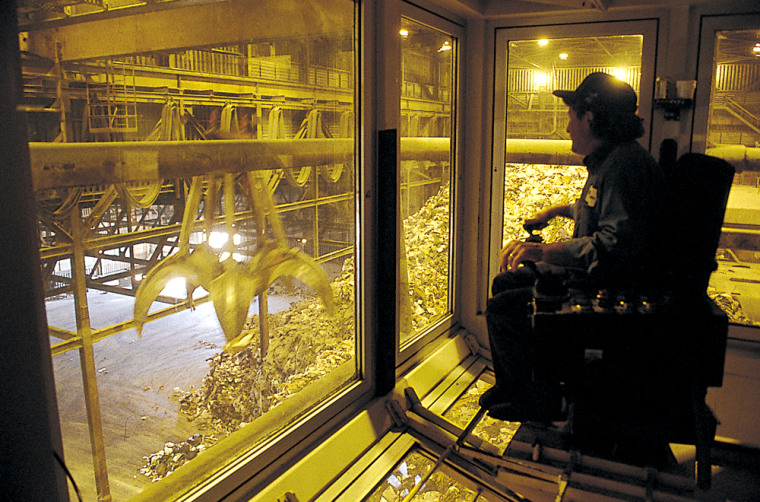Waste Management Inc., the nation's largest garbage hauler and landfill operator, will spend hundreds of millions of dollars over the next dozen years to make its operations more environmentally friendly, CEO David Steiner announced Thursday.
The company plans to increase its energy production from waste, buy more fuel-efficient vehicles and more than double the amount of recyclable material it processes, among other initiatives.
Steiner said the "green" strategy will also boost Waste Management's bottom line. The company reported $13.4 billion in revenue in 2006.
"I don't look at it as how much it's going to cost," said Steiner, stopping short of putting a price tag on the plan. "I look at it as how much it's going to return."
Primarily through burning waste and using methane gas-to-electricity technology Waste Management now creates enough energy to power roughly 1 million homes a year. By 2020, it expects to double that output.
60 landfill energy projects
Already, the company is spending about $400 million over the next five years building facilities at 60 landfills to convert methane gas to electricity. Landfills are the largest source of methane emissions in the United States, accounting for 34 percent of such releases, according to the Environmental Protection Agency. Methane is the second-biggest man-made contributor to global warming behind carbon dioxide.
Waste Management operates 283 landfills in North America, and 73 already have some form of methane-to-energy capabilities.
Paul Kleinschmidt, an analyst with Argus Research, said such "green" initiatives look good on paper, but it can take years to evaluate their financial and environmental successes.
"They're trying to push the industry in that way, and some of their competitors will have a hard time keeping up," Kleinschmidt said. "That's important because they might be able to get some business out of it."
Goal to nearly triple recycling
On the recycling side, the company hopes to increase the amount of recyclable material it processes from 8 million tons a year to 20 million tons by 2020. Steiner said the growth will come in part through more products entering the recycling stream, such as electronics.
The company has a recycling arrangement with Sony Corp. and hopes to form similar deals with other electronics companies.
In recent years, Steiner said, Waste Management's capital spending tab has been $1.2 billion to $1.4 billion annually, and a huge chunk of it — 30 percent to 40 percent — is typically used to buy trucks and heavy equipment.
By 2020, the company wants to increase its fleet's fuel efficiency by 15 percent while reducing emissions by the same amount.
Steiner said the company now buys its trucks from most of the big commercial manufacturers, and it's pressing them to begin using new engine and other technologies. He said Waste Management intends to make future truck purchases from the company or companies that can provide "greener" vehicles. Those purchases could total $5 billion over a 10-year period.
Waste Management's initiative is similar to goals laid out by Wal-Mart Stores Inc. in late 2005. Wal-Mart says it's still trying to determine how far it's come reducing waste, using more renewable energy and stocking more green products.
But its fleet of about 7,200 semitractor-trailer trucks is already about 15 percent more fuel efficient, and industry experts and environmentalists say Wal-Mart is ahead of other trucking operations. The Sierra Club has said the retailer's demand for vehicles could prompt truck makers to bring more efficient models to market faster.
Waste Management says it will report publicly on a regular basis on its progress meeting its goals.
